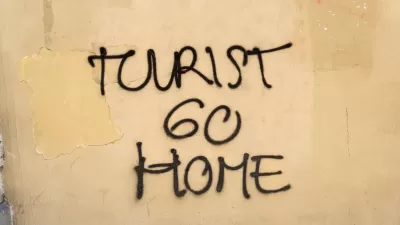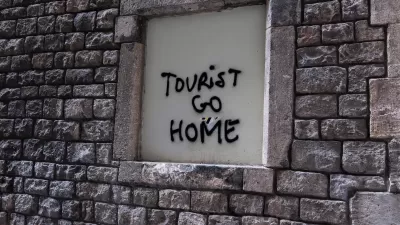A new attempt at mitigating the social impact of short-term rentals and mass tourism.

Short-term rentals have exacerbated the affordability of housing in neighborhoods all over the country, according to researchers, and have also been accused of ruining neighborhood character in many others.
Feargus O'Sullivan reports on the emergence of a new short-rental company called Fairbnb that makes an attempt at a more ethical business model.
"It’s called Fairbnb, and it’s trying to refashion the home-sharing model so that short-stay apartment rentals can enrich the amenities and housing choices of the communities that host them," according to O'Sullivan.
The company was founded in Amsterdam, and has spread its co-op membership to several European cities in recent years. A full launch if the platform is imminent:
While it is only just preparing to accept registrations from hosts, its community-building exercises have attracted more than 700 people who are ready to list their homes. As its launch date nears, Fairbnb is now going through a crowdfunding push, mainly to fast-track technology development, such as a mobile counterpart to its upcoming online site.
As for how Fairbnb aims to transform the short-term rental business, O'Sullivan also provides this explanation, and more, in the article,
Fairbnb’s model diverges from the standard model in several key ways. Like other home-share sites, it plans to levy a commission on bookings (in Fairbnb’s case, of 15 percent, which is broadly similar to Airbnb). Half of this money would be fed back into the local community where a unit is rented out.
FULL STORY: ‘Fairbnb’ Wants to Be the Unproblematic Alternative to Airbnb

Alabama: Trump Terminates Settlements for Black Communities Harmed By Raw Sewage
Trump deemed the landmark civil rights agreement “illegal DEI and environmental justice policy.”

Planetizen Federal Action Tracker
A weekly monitor of how Trump’s orders and actions are impacting planners and planning in America.

The 120 Year Old Tiny Home Villages That Sheltered San Francisco’s Earthquake Refugees
More than a century ago, San Francisco mobilized to house thousands of residents displaced by the 1906 earthquake. Could their strategy offer a model for the present?

In Both Crashes and Crime, Public Transportation is Far Safer than Driving
Contrary to popular assumptions, public transportation has far lower crash and crime rates than automobile travel. For safer communities, improve and encourage transit travel.

Report: Zoning Reforms Should Complement Nashville’s Ambitious Transit Plan
Without reform, restrictive zoning codes will limit the impact of the city’s planned transit expansion and could exclude some of the residents who depend on transit the most.

Judge Orders Release of Frozen IRA, IIJA Funding
The decision is a victory for environmental groups who charged that freezing funds for critical infrastructure and disaster response programs caused “real and irreparable harm” to communities.
Urban Design for Planners 1: Software Tools
This six-course series explores essential urban design concepts using open source software and equips planners with the tools they need to participate fully in the urban design process.
Planning for Universal Design
Learn the tools for implementing Universal Design in planning regulations.
Clanton & Associates, Inc.
Jessamine County Fiscal Court
Institute for Housing and Urban Development Studies (IHS)
City of Grandview
Harvard GSD Executive Education
Toledo-Lucas County Plan Commissions
Salt Lake City
NYU Wagner Graduate School of Public Service





























